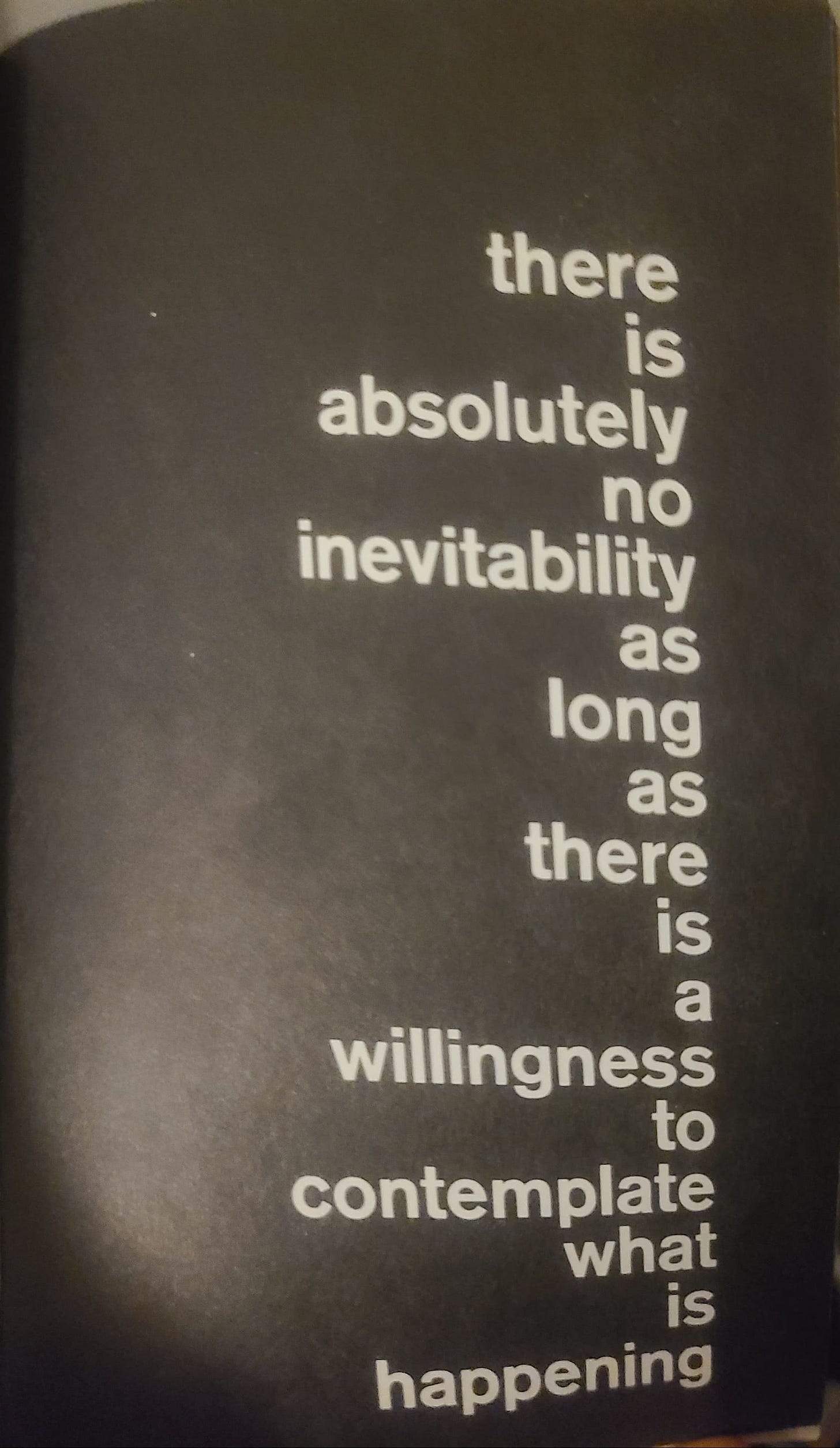Big pictures and Mainstream Delusions [Trenchant Edges]
A little more about what I'm trying to do
Welcome back to a shiny new Monday.
Estimated reading time: 9 minutes, 0 seconds. Contains 1800 words
I’m your host Stephen Fisher and this is the Trenchant Edges, a newsletter about fringe culture and ideas that have been passed over.
We’ve been kinda tunnel visioning towards UFOs this past week, and I wanted to zoom out to the real-world context this newsletter is trying to both push against and find alternatives to.
Part of what motivates me to write this topic today is reading George Lakoff’s Don’t Think of an Elephant, which discusses mental frames and their consequences for political discourse:
Frames are mental structures that shape the way we see the world. As a result, they shape the goals we seek, the plans we make, the way we act, and what counts as good or bad outcome of our actions. In politics our frams shape our social policies and the institutions we form to carry out policies. To change our frames is to change all of this. Reframing is social change.
You can't see or hear frames. They are part of what we cognitive scientists call the "cognitive unconscious" - structures in our brains that we cannot consciously access, but know by their consequences. What we call "common sense" is made up of unconscious, automatic, effortless inferences that follow from our unconscious frames.
We also know frames through language. All words are defined relative to conceptual frames. When you hear a word, its frame is activated in your brain.
Yes, in your brain. As the title of this book shows, even when you negate a frame, you activate the frame. If I tell you, "Don't think of an elephant!," you'll think of an elephant.
Though I found this out first in the study of cognitive linguistics, it has begun to be confirmed by neurosciene. When a macaque monkey grasps and object, a certain group of neurons in the monkey's ventral premotor cortex (which choreographs actions, but does not directly move the body) are activated. When the monkey is trained not to grasp the object, most of those neurons are inhibited (they turn off), but a portion of the same neurons used in grasping still turn on. That is, to actively not grasp requires thinking of what grasping would be.
Not only does negative a frame activate that frame, but the more it is activated, the stronger it gets. The omral for political discourse is clear: When you argue against someone on the other side using their language and their frames, you are activating their frames in those who hear you, and undermining your own views. For progressives, this means avoiding the use of convervative langauge and the frames that the language activates. It means you should say what you believe using your langauge, not theirs."
Now, I learned about framing discourse and reframing from Neuro-linguistic Programing, a kind of pseudo-hypnosis self-help modality that’s maybe 5 or 10% useful ideas and the rest is just a mess of observations about language that may or may not have any value and what are effectively psychological old wives tales.
It’s been a core part of my writing and activism over the years. Because unlike a lot of NLP, framing is a real thing.
Remember that UFO Report from the US Intelligence Community? The frame there was, “Gosh, these reports sure are mysterious. Sure would be nice if we had the money and systems in place to address this problem.”
Every section concluded with, essentially, asking for more money. As is right and proper for a bureaucracy. Everyone gets mad about government waste but nothing gets done if you don’t spread around some cash. So if you want the government to explain UFOs you gotta pay it Explain UFO money.
Alas, alas.
But I digress. The point is that frames are a very practical way of recognizing what someone is talking about, the story it implies, and what they’re trying to do politically.
So What’s the Big Picture?
Sitting from my comfortable air-conditioned bedroom in the USA, it takes practical effort to zoom out to see what’s going on in the world at large.
Let me tell you the story of how I became disillusioned. My first real blackpill, as the kids say. I was about 10 years old and it was the late 90s. Bill Clinton’s Blowjob & Perjury scandal was all the news wanted to talk about.
I was in middle school, homeroom. We were watching “Channel ONE” a news program for kids. The first news story was about Clinton launching airstrikes into Sadaam Hussein’s Iraq. They didn’t talk about why just kind of assumed we’d all think Sadaam was bad so this was justified and good. The coverage lasted about ten seconds.
It didn’t explain why Clinton was doing this now or any of the messy history between our governments or ask questions about, say, how many people were killed by those missiles.
The rest of the show, maybe ten minutes, went back to Bill’s marital infidelities and lying under oath. Every detail they could stuff in that was investigated, hidden motives discussed. etc.
And I just sat there, wondering how many people were dead on the other side of the planet thinking, “Oh no. Adults are insane. This is going to be a problem.”
I never did find out how many died. A bit of googling suggests about 120 people died in the year 1999, with 442 injuries.
So from a young age, I’ve been skeptical of typical narratives in politics.
My basic argument here is that mainstream politics, which is broader than most people using the term imagine, is fundamentally broken.
Not just broken in the sense that it doesn’t work or fulfill its promises or that stuff. But in the sense that it’s no longer capable of recognizing, evaluating, or responding to threats in a rational manner.
The political class, from journalists to think tanks to politicians to funding networks, is so focused on holding and expanding their personal power that they can’t see the forest for the trees.
Nothing has proven this more than the Trump and Biden years, where exaggerated and incendiary rhetoric has intensified on “both” mainstream sides and from the fringes.
I’ve done it, you probably have too.
20 Years of pretending the “Global War on Terror” was about saving America from an existential threat has reframed all of our conversations as apocalyptic scenarios where the good elect defend the world from the evil bad people.
Now, when I say mainstream, I probably mean something different than you think.
If something is on the Internet and accessible by and for millions, it’s part of the amalgamation of the mainstream.
Bernie Sanders made his faux-socialism mainstream. Qanon has made fascist conspiracies about blood libel mainstream.
The mainstream hasn’t been a monolith since Cable news shifted the options for what point of view you could get your news from. And after news stations started covering Twitter, it’s just gone.
So while corporate media tends to cluster in its output, their reach and influence are smaller than ever.
Most people are still framing “the mainstream” like it’s 1968.
Consider: Gaming youtuber Pewdiepie’s videos get about 400-500 million views a month with 110 million subscribers. Meanwhile the two most watched Cable News shows, Rachel “It’s the Russians” Maddow and Tucker “Don’t mind me normalizing white nationalism on primetime” Carlson each have about 3.5 million viewers per episode. HBO host John Oliver’s youtube videos for their main segments get upwards of 2+ million views on average.
Now, these are apples and oranges.
But it’s clear that media consumption has exploded broadly over the last 20 years. People get a ton more information from peer networks and social media than they do “traditional news”. The New York Times has 7.8 million subscribers and the Washington Post has around 3 million.
There are 320 million people in America.
Even the real winners here aren’t taking home much more than 1-2% of the total country’s population.
News now spreads much more horizontally among self-selected peer networks, and diagonally through social network algorithms via Facebook, youtube, and Twitter than it does through any vertical broadcast system.
Not understanding that the mainstream now is less like a mighty unified river than the Mississippi Delta’s wetlands.
That’s what the mainstream looks like now in the US, only with broad affinity networks for liberal, conservative, progressive, and Christian wings. At the edges, a handful of leftists and fascists continue to try and break through the corporate blackout of their messages.
With the latter much more effective at spreading their message, backed by billionaire dark money networks and the usual slew of collaborators from left to right.
A consequence of all this is that it’s difficult to establish the kind of illusion of consensus that we used to pretend was how this country was governed.
No matter who’s in charge now it’s plainly clear that at least a third of the country is hella mad about it. One imagines this was more or less as true in the past, but it was harder to find those contrarian voices.
The irrepressible optimist in me sees this as a likely good thing and hopes we’ll see dramatic improvements in people’s ability to be critical of media they consume and their own attachments to the same.
All for the best, eh?
The rationalist in me continues seeing the signs of a rising fascist movement that needs to be both fought and deescalated.
The American Empire is also in decline, which has been steady in the early 00s as Bush burned off the most dramatic surge of global good will to the US in history, kind of stabilized into a slow droop under Obama, and accelerated under Trump’s anti-globalization policies.
But all that’s just a fucking sideshow, frankly. As the weather from the last few years increasingly proves, major changes need to be made to our global infrastructure, business practices, and yes consumption habits to avoid worst case climate change scenarios.
The pandemic’s few weeks of real shutdown showed that nature is still willing and able to bounce back to some degree, but overall it looks like it’s had a fairly negligible effect on climate change as a whole.
The ideals of consumerism must be dismantled and a move to a less disposable future has to happen. This probably means coordinating global institutions because as ill-equipped as they are for this task, they’re the only extant levers for these changes to happen.
We’re, uh, all on the clock. And time’s not looking great.
I don’t have any kind of comprehensive solution. I figure our best options are listening to indigenous people and supporting their efforts because their cultures already have a vastly different idea of what a relationship to the earth looks like.
I don’t think we’re doomed, but we’ve got to start moving in a new direction if we want to avoid that kind of fate. And we must accept that this year may be one of the last years of luxury we’ll see.



"I figure our best options are listening to indigenous people and supporting their efforts because their cultures already have a vastly different idea of what a relationship to the earth looks like." - a bit like it was argued in this book?
http://www.thespiritof76.com/NEX_NEWS/Storage/TO76/GN_GOING.HTM
anyway, I hope people will develop not just a bit shallow repetition of past rituals but more dymanic understanding of situation, so for example killing whales 'traditionally' even after they (whales) got shitload of deaths from whaling, pollution, etc actually will be understood as.. not kind thing to do.